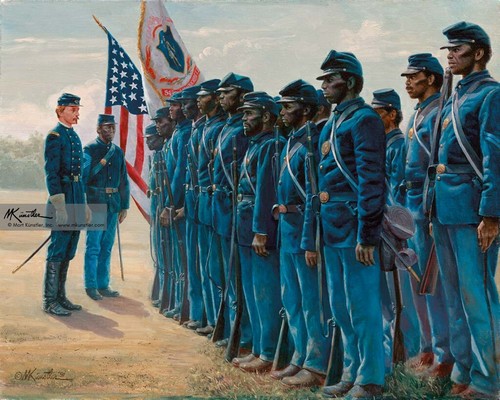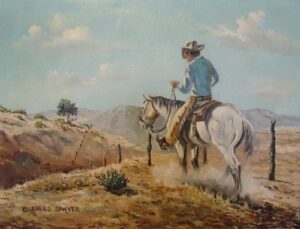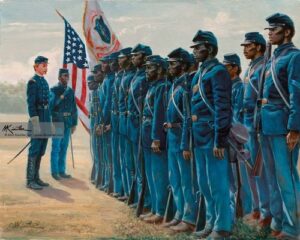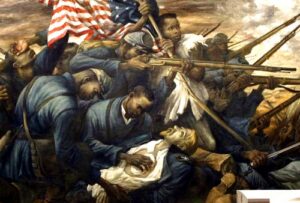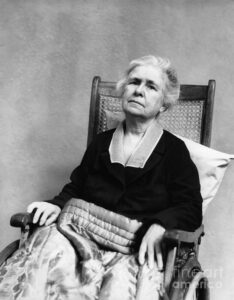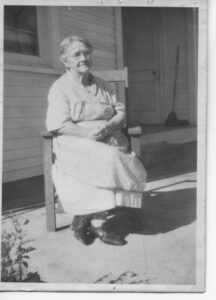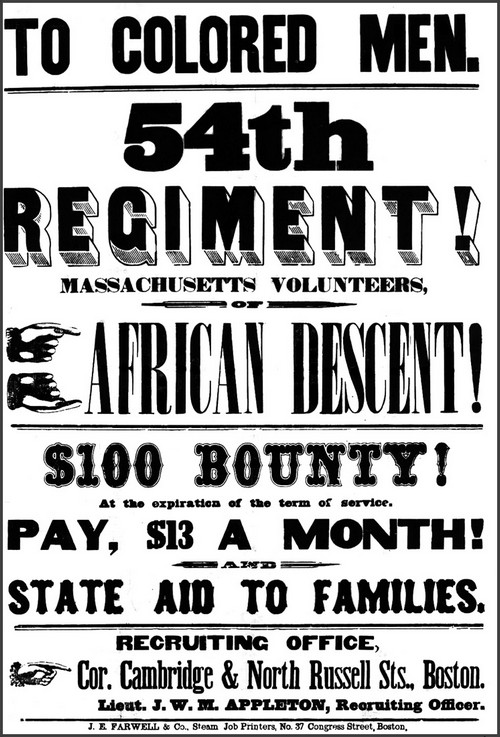
Walter walked down the street, the Masschetutes was covered with many people. Women and their children hurried down the boardwalk in front of the general store. Men rode in carriages while others swept the doorways of their stores. The town was all abustle, everyone having something to do. Many young men went off to fight, it was 1863, and many of the men left.
Walter felt sweat trickle down his forehead. Even though it was still only spring, the cold could still be felt even though the flowers and trees were abloom, he felt himself growing hot. He crept along the alleyways, staying in the shadows. Even though President Lincoln signed the Emancipation Proclamation on January first, many people were hostile still towards us blacks. We were still treated as though we were just animals, property to be sold as our master willed. I was a free man though, having been saved from a plantation by some union soldiers coming through our Georgia plantation about a year back. I still wasn’t used to the fact that I could get a job, and earn money. I would be my own master, and I was proud.
Walter’s clothes were stained from the mud of the early spring mud along the side streets. His feet were bare, not having enough money to spare on clothes. His jeans overalls were too short for his long legs, his threadbare shirt hung over his thin frame, his face was gaunt from lack of food and of proper shelter. His dark skin was taut over his bones, his eyes sunken into his skull. His eyes were a dark brown, which looked like chocolate out in the sunshine. In the dark, they looked almost black. Back when he was with his sister, Betsie, he had a sparkle in his eyes and a skip in his step. He smiled when he thought of her. She was short, her teeth were whiter than the cotton he would pick. Her skin was darker than anything he’d ever seen, her cheeks were round and rosy. Walter angrily pushed his thoughts of her aside. His old master, Mr. Oakly, sold her away from him while she was working in the main house to an heiress to be her personal assistant. For days after that Walter mourned, trying to escape, but in vain. Many times he was caught, he would then be wiped until he was unconscious. They would drag his body and lock him inside the cabin he used to share with Betsie.
“Calling all colored folks! Come and join the army! The fifty-fourth regiment of Massechutes is calling you to join!” Walter was shaken from his thoughts by the loud, booming voice that could be heard over the noise of the townsfolk. Walter looked down the main street. He saw a group of blacks gathered around a large man on a soapbox, down the street by the post office.
Looking both ways, Walter darted down the street, dodging the wagons and people. His long legs helped to get him to the post office in no time at all. “Be the first blacks to join the Northern army! Come one, come all!” Walter was a head above all the other men, so he could see the man who was speaking. He was short and fat. His bald head was covered with a bowler hat, his suit was stained with sweat and dirt.
Walter couldn’t see the sign that the man was holding high above his head. It wouldn’t have mattered if he could see it. He couldn’t read or write, neither could the other men most likely. Blacks weren’t allowed to church or to read or write. That was before the Emancipation Proclamation, but he didn’t have the time or the money to learn to read or write.
“What do you think of this?” A man in front of him was talking to a group of his friends around him. They were just as dirty and ragged as he was. The tallest among their little group, which was about five foot eight, spoke quietly to them.
“I believe we should fight, we should fight for the men and the union that saved us from slavery. We should give back something?” Walter mulled over what the man said. They didn’t have jobs, most likely without homes or food, considering the clothes they wore. Many wore clothes that were too small, others too big.
“Right now anyways we don’t have jobs and don’t have food. We would get a roof over our heads and food in our stomachs.” The voice was coming from a small man, not more than five foot three, his body was covered with thick muscle, his stout arms crossed over his broad chest.
“Come sign this paper, and you will then be asked to come to the camp immediately outside of town. Head southwards until you hit the main trail that leads to Quabbin. We will make camp there.” The man sighed, wiping his head with a dirty handkerchief. The men came forward in a surge, like a wave they pushed each other forward towards the desk. Men grabbed for the papers.
“Wait!” Walter yelled above the loud voices of the men surging around the desk. “Stop!”
The men turned around, their eyes turned on him. Many of the men glowered angrily at him. Walter felt as though they would strangle him, but he realized they had forgotten something.
“Men, we can’t write our own names. We can’t read neither. What’ da we gonna do? They may be tryin’ to trick us back into slavery.” Many men all agreed in unison, their eyes turned back to the man at the desk. The man stood, his gaze scanning the wall of men in front of him.
“Would we, northern, abolitionists, really try to trick you? If you want proof go find another man who can read. We need your help. There aren’t enough white men to fight, and now we are asking you to give your efforts and time back to us in return for your freedom. Please, consider.” The man persuasively turned the men’s favor back to him, and they told the man their names one at a time. The man wrote their names down on sheets of paper.
“Now, come with me.” In all, six hundred men had signed up for the regiment, Walter being one of them. They trudged along behind the man, who was riding on a horse. The horse whinnied in protest at the weight upon his back, but the man didn’t seem to notice. They followed along, their feet blistering and being torn by the gravel along the road. They weren’t allowed to walk in the mud or on the grass, because they were supposed to stay in a line behind the man’s horse. The man, of course, didn’t walk his horse through the mud, so they had to do likewise.
They walked for hours, the spring air was humid, making the men sweat. Walter pulled at the collar of his shirt, the sweat dripping from his dark forehead. The group of men he had seen early were no longer talking, their throats were probably as dry as he was. The thing he noticed was that not once did they complain. They were used to the hard work that their old masters had laid upon them. This was better than working out in the fields day in and day out. This was a lot better, they were free.
They walked into camp about four o’clock in the afternoon, their feet blistered and bleeding. The man got down from his horse, the horse stomping its hooves in relief.
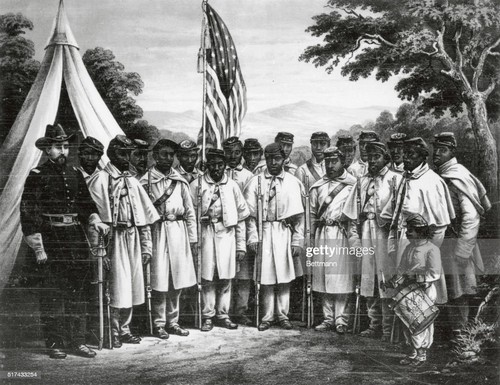
“Come, men, meet your captain.” The man led them forward, his legs almost giving way beneath the fat that covered his frame. They came to a cabin, and a tall man came out. His face was covered with a large brown handlebar mustache. His hair was combed neatly back. He stood upon the porch, his dark eyes scanning the men who stood before him. When his eyes fell upon Walter, his eyebrows raised in surprise, probably because of his height. He clapped his hands.
“Men, thank you for answering our call. We would like you all to head to your bunkers, where you will be given your uniforms and meet at the mess tent.” He turned away quickly, not saying a thing about where the mess tent was or where their bunkers were. Still, no one complained. They clambered up a hill to where they were greeted by a thin man with a large beard. His hair was down to his shoulders. His blonde hair was shiny as if he hadn’t washed it for days. His eyes were bright, bluer than the lack below.
“Welcome, this will be y’alls bunkers. I suggest hurryin’ with your dressin’. We gonna have us some supper.” He led them into a large tent, the cots neatly placed against the walls. Laying on the cots large boots sat, with a union uniform and matching hat.
“Thank ya, sir.” Walter thanked the man, taking his hand. The man smiled and shook it vigorously.
“You welcome soldier.” He saluted, leaving the men in silence. The men looked around at their surroundings.
“Well, here we are, I guess.” A young man with dark skin sank down onto a cot near the door. He looked down at his bleeding feet, his dark eyes scanned the room. Walter took the bed next to him, and he picked up the uniform.
“Well, we best all hurry and dress as the man said.” Walter undressed, donning his uniform. He placed the small navy blue hat upon his large head. He then looked at himself in the only mirror that donned the pole that held the tent up. He then winced as he tried to pull his boots on. The blisters had popped, leaving open sores in their wake.
“What are we gonna do about our feet?” One of the men called out. “Does anyone got some salve? My Mamma used to make my pa and I salve for our feet when we came in from a day’s work out in the cotton fields.” The tall man that he had seen in the little group over at the post office spoke up. “Well, anyway, I know we don’t have nothin’ so let me introduce myself.” He stood, his tall form erect in the tent. “My name is Thomas, but you may all call be Tommy.” He waved to them, and everyone said hello.
“Well, I’m Walter, and I think we could wash our feet down in that lake to get the sores clean. Maybe then we could get the boots on.” The men looked at Walter, their eyes widening at the sight of me in my tall figure in uniform.
“I’m Billy, and I think that’s a great plan.” It was the young man that had chosen the cot by the door. He smiled and picked up some boots that looked to large for him.
The other men heartily agreed, and they trudged down the hill to where the lake met the camp. The men slowly put their feet in the water, soaking the sores. They made a wall around the lakefront, as they soaked their blistered feet in the cold water of the lake.
They then were able to put their boots on. The men then shuffled into the mess tent that was situated between the trail and the lake. They came in to find a large group of men, whites, blacks, and Hispanics. There were men of all races, eating at the same tables, sharing the same meal, as equals.

